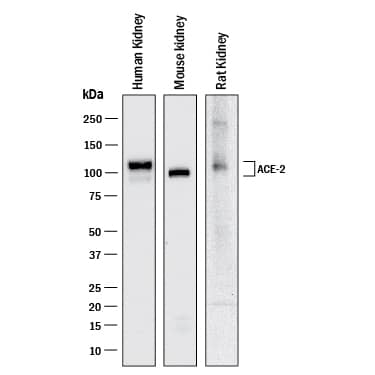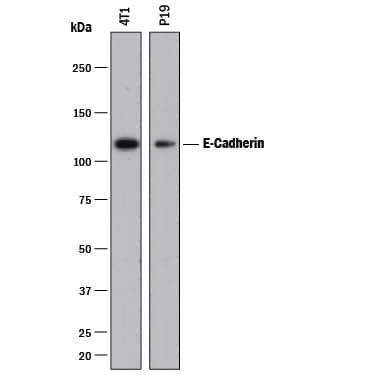Mouse ACE-2 Antibody Summary
Gln18-Thr740
Accession # Q8R0I0
Customers also Viewed
Applications
This antibody functions as an ELISA detection antibody when paired with Rat Anti-Mouse ACE‑2 Monoclonal Antibody (Catalog # MAB34371).
This product is intended for assay development on various assay platforms requiring antibody pairs. We recommend the Mouse ACE-2 DuoSet ELISA Kit (Catalog # DY3437-05) for convenient development of a sandwich ELISA.
Please Note: Optimal dilutions should be determined by each laboratory for each application. General Protocols are available in the Technical Information section on our website.
Scientific Data
 View Larger
View Larger
Detection of Mouse ACE‑2 by Western Blot. Western blot shows lysates of mouse kidney tissue. PVDF membrane was probed with 0.25 µg/mL of Goat Anti-Mouse ACE-2 Antigen Affinity-purified Polyclonal Antibody (Catalog # AF3437) followed by HRP-conjugated Anti-Goat IgG Secondary Antibody (Catalog # HAF019). A specific band was detected for ACE-2 at approximately 95 kDa (as indicated). This experiment was conducted under reducing conditions and using Immunoblot Buffer Group 1.
 View Larger
View Larger
Detection of ACE-2 in HEK293 Human Cell Line Transfected with Mouse ACE-2 and eGFP by Flow Cytometry. HEK293 human embryonic kidney cell line transfected with (A) mouse ACE-2 or (B) irrelevant protein, and eGFP was stained with Goat Anti-Mouse ACE-2 Affinity Purified Polyclonal Antibody (Catalog # AF3437) followed by Allophycocyanin-conjugated Anti-Goat IgG Secondary Antibody (F0108). Quadrant markers were set based on Goat IgG control antibody (AB-108-C, data not shown). Staining was performed using our Staining Membrane-associated Proteins protocol.
 View Larger
View Larger
ACE‑2 in Mouse Kidney. ACE‑2 was detected in perfusion fixed frozen sections of mouse kidney using 15 µg/mL Goat Anti-Mouse ACE‑2 Antigen Affinity-purified Polyclonal Antibody (Catalog # AF3437) overnight at 4 °C. Tissue was stained (red) and counterstained (green). View our protocol for Fluorescent IHC Staining of Frozen Tissue Sections.
 View Larger
View Larger
ACE‑2 in Mouse Kidney. ACE-2 was detected in perfusion fixed frozen sections of mouse kidney using Goat Anti-Mouse ACE-2 Antigen Affinity-purified Polyclonal Antibody (Catalog # AF3437) at 15 µg/mL overnight at 4 °C. Tissue was stained using the Anti-Goat HRP-DAB Cell & Tissue Staining Kit (brown; Catalog # CTS008) and counterstained with hematoxylin (blue). Lower panel shows a lack of labeling if primary antibodies are omitted and tissue is stained only with secondary antibody followed by incubation with detection reagents. View our protocol for Chromogenic IHC Staining of Frozen Tissue Sections.
 View Larger
View Larger
Detection of Mouse ACE‑2 by Simple WesternTM. Simple Western lane view shows lysates of mouse kidney tissue, loaded at 0.2 mg/mL. A specific band was detected for ACE-2 at approximately 141 kDa (as indicated) using 2.5 µg/mL of Goat Anti-Mouse ACE-2 Antigen Affinity-purified Polyclonal Antibody (Catalog # AF3437) followed by 1:50 dilution of HRP-conjugated Anti-Goat IgG Secondary Antibody (Catalog # HAF109). This experiment was conducted under reducing conditions and using the 12-230 kDa separation system.
 View Larger
View Larger
Mouse ACE‑2 ELISA Standard Curve. Recombinant Mouse ACE‑2 protein was serially diluted 2-fold and captured by Rat Anti-Mouse ACE‑2 Monoclonal Antibody (MAB34371) coated on a Clear Polystyrene Microplate (DY990). Goat Anti-Mouse ACE‑2 Antigen Affinity-purified Polyclonal Antibody (Catalog # AF3437) was biotinylated and incubated with the protein captured on the plate. Detection of the standard curve was achieved by incubating Streptavidin-HRP (DY998) followed by Substrate Solution (DY999) and stopping the enzymatic reaction with Stop Solution (DY994).
Preparation and Storage
- 12 months from date of receipt, -20 to -70 °C as supplied.
- 1 month, 2 to 8 °C under sterile conditions after reconstitution.
- 6 months, -20 to -70 °C under sterile conditions after reconstitution.
Background: ACE-2
ACE-2, also called ACEH (ACE homologue), is an integral membrane protein and a zinc metalloprotease of the ACE family that also includes somatic and germinal ACE (1). Mouse ACE-2 has about 40% amino acid identity to the N- and C-terminal domains of mouse somatic ACE. The predicted mouse ACE-2 protein sequence consists of 798 amino acids, including a N-terminal signal peptide, a single catalytic domain, a C-terminal membrane anchor, and a short cytoplasmic tail. ACE-2 cleaves angiotensins I and II as a carboxypeptidase. ACE-2 mRNA is found at high levels in testis, kidney and heart and at moderate levels in colon, small intestine and ovary. Classical ACE inhibitors such as captopril and lisinopril do not inhibit ACE-2 activity. Novel peptide inhibitors of ACE-2 do not inhibit ACE activity (2). Genetic data from Drosophila, mice and rats show that ACE-2 is an essential regulator of heart function in vivo (3). In addition, ACE-2 is a key SARS-CoV Spike protein receptor in vivo and has a critical function in acute lung injury (4, 5).
- Tipnis, S.R. et al. (2000) J. Biol. Chem. 275:33238.
- Crackower, M.A. et al. (2002) Nature 417:822.
- Huang, L. et al. (2003) J. Biol. Chem. 278:15532.
- Kuba, K. et al. (2005) Nature Med. 11:875.
- Ima, Y. et al. (2005) Nature 436:112.
Product Datasheets
Citations for Mouse ACE-2 Antibody
R&D Systems personnel manually curate a database that contains references using R&D Systems products. The data collected includes not only links to publications in PubMed, but also provides information about sample types, species, and experimental conditions.
19
Citations: Showing 1 - 10
Filter your results:
Filter by:
-
Male bias in ACE2 basic science research: Missed opportunity for discovery in the time of COVID-19
Authors: Stanic B, Maddox S, Arlindo de Souza AM et al.
American journal of physiology. Regulatory, integrative and comparative physiology
-
Enteroendocrine Cells Protect the Stem Cell Niche by Regulating Crypt Metabolism in Response to Nutrients
Authors: McCauley HA, Riedman AM, Enriquez JR et al.
Cellular and Molecular Gastroenterology and Hepatology
-
Gut microbiota-derived metabolites confer protection against SARS-CoV-2 infection
Authors: Julia A. Brown, Katherine Z. Sanidad, Serena Lucotti, Carolin M. Lieber, Robert M. Cox, Aparna Ananthanarayanan et al.
Gut Microbes
Species: Mouse
Sample Types: Whole Tissue
Applications: Immunohistochemistry -
A dietary change to a high-fat diet initiates a rapid adaptation of the intestine
Authors: JR Enriquez, HA McCauley, KX Zhang, JG Sanchez, GT Kalin, RA Lang, JM Wells
Cell Reports, 2022-11-15;41(7):111641.
Species: Transgenic Mouse
Sample Types: Whole Tissue
Applications: IHC -
SARS-CoV-2 deregulates the vascular and immune functions of brain pericytes via Spike protein
Authors: Rayan Khaddaj-Mallat, Natija Aldib, Maxime Bernard, Anne-Sophie Paquette, Aymeric Ferreira, Sarah Lecordier et al.
Neurobiology of Disease
Species: Mouse
Sample Types: Whole Tissue
Applications: Immunohistochemistry -
Chitinase 3-like-1 is a therapeutic target that mediates the effects of aging in COVID-19
Authors: Suchitra Kamle, Bing Ma, Chuan Hua He, Bedia Akosman, Yang Zhou, Chang-Min Lee et al.
JCI Insight
-
E-cigarette vape and lung ACE2 expression: Implications for coronavirus vulnerability
Authors: Valeria Lallai, Letizia Manca, Christie D. Fowler
Environmental Toxicology and Pharmacology
Species: Mouse
Sample Types: Whole Tissue
Applications: Immunohistochemistry -
Expression of the ACE2 Virus Entry Protein in the Nervus Terminalis Reveals the Potential for an Alternative Route to Brain Infection in COVID-19
Authors: K Bilinska, CS von Barthe, R Butowt
Frontiers in Cellular Neuroscience, 2021-07-05;15(0):674123.
Species: Mouse
Sample Types: Tissue Homogenates, Whole Tissue
Applications: IHC, Western Blot -
Mice with induced pulmonary morbidities display severe lung inflammation and mortality following exposure to SARS-CoV-2
Authors: Reut Falach, Liat Bar-On, Shlomi Lazar, Tamar Kadar, Ohad Mazor, Moshe Aftalion et al.
JCI Insight
-
Expression of the ACE2 virus entry protein in the nervus terminalis suggests an alternative route for brain infection in COVID-19
Authors: K Bilinska, CS von Barthe, R Butowt
bioRxiv : the preprint server for biology, 2021-06-07;0(0):.
Species: Mouse
Sample Types: Tissue Homogenates, Whole Tissue
Applications: IHC, Western Blot -
Sex Differences in the Induction of Angiotensin Converting Enzyme 2 (Ace-2) in Mouse Lungs after E-Cigarette Vapor Exposure and Its Relevance to Covid-19
Authors: Vegi Naidu, Amir A Zeki, Pawan Sharma
Journal of Investigative Medicine
Species: Mouse
Sample Types: Tissue Homogenates, Whole Tissue
Applications: Immunohistochemistry, Western Blot -
A cellular and spatial map of the choroid plexus across brain ventricles and ages
Authors: Neil Dani, Rebecca H. Herbst, Cristin McCabe, Gilad S. Green, Karol Kaiser, Joshua P. Head et al.
Cell
-
Chitinase 3-like-1 is a Therapeutic Target That Mediates the Effects of Aging in COVID-19
Authors: S Kamle, B Ma, CH He, B Akosman, Y Zhou, CM Lee, WS El-Deiry, K Huntington, O Liang, J Machan, MJ Kang, HJ Shin, E Mizoguchi, CG Lee, JA Elias
bioRxiv : the preprint server for biology, 2021-02-16;0(0):.
Species: Mouse
Sample Types: Whole Tissue
Applications: IHC -
Oxygen conditions oscillating between hypoxia and hyperoxia induce different effects in the pulmonary endothelium compared to constant oxygen conditions
Authors: P Wohlrab, M Johann Dan, W Schaubmayr, A Tiboldi, K Krenn, K Markstalle, R Ullrich, K Ulrich Kle, V Tretter
Physiological Reports, 2021-02-01;9(3):e14590.
Species: Mouse
Sample Types: Cell Lysates
Applications: Western Blot -
Expression of the SARS-CoV-2 Entry Proteins, ACE2 and TMPRSS2, in Cells of the Olfactory Epithelium: Identification of Cell Types and Trends with Age.
Authors: Bilinska K, Jakubowska P, Von Bartheld C, Butowt R
ACS Chem Neurosci, 2020-05-19;11(11):1555-1562.
Species: Mouse
Sample Types: Tissue Homogenates, Whole Tissue
Applications: IHC-Fr, Western Blot -
Novel Variants of Angiotensin Converting Enzyme-2 of Shorter Molecular Size to Target the Kidney Renin Angiotensin System
Authors: Jan Wysocki, Arndt Schulze, Daniel Batlle
Biomolecules
-
Expression and regulation of the neutral amino acid transporter B0AT1 in rat small intestine
Authors: J Jando, SMR Camargo, B Herzog, F Verrey
PLoS ONE, 2017-09-15;12(9):e0184845.
Species: Rat
Sample Types: Cell Lysates, Whole Tissue
Applications: IHC-Fr, Western Blot -
ACE2 links amino acid malnutrition to microbial ecology and intestinal inflammation.
Authors: Hashimoto T, Perlot T, Rehman A
Nature, 2012-07-25;487(7408):477-81.
Species: Mouse
Sample Types: Tissue Homogenates, Whole Tissue
Applications: IHC, Western Blot -
Orphan transporter SLC6A18 is renal neutral amino acid transporter B0AT3.
Authors: Singer D, Camargo SM, Huggel K, Romeo E, Danilczyk U, Kuba K, Chesnov S, Caron MG, Penninger JM, Verrey F
J. Biol. Chem., 2009-05-28;284(30):19953-60.
Species: Mouse
Sample Types: Cell Lysates, Whole Tissue
Applications: IHC, Western Blot
FAQs
No product specific FAQs exist for this product, however you may
View all Antibody FAQsIsotype Controls
Reconstitution Buffers
Secondary Antibodies
Reviews for Mouse ACE-2 Antibody
Average Rating: 5 (Based on 2 Reviews)
Have you used Mouse ACE-2 Antibody?
Submit a review and receive an Amazon gift card.
$25/€18/£15/$25CAN/¥75 Yuan/¥2500 Yen for a review with an image
$10/€7/£6/$10 CAD/¥70 Yuan/¥1110 Yen for a review without an image
Filter by:






















